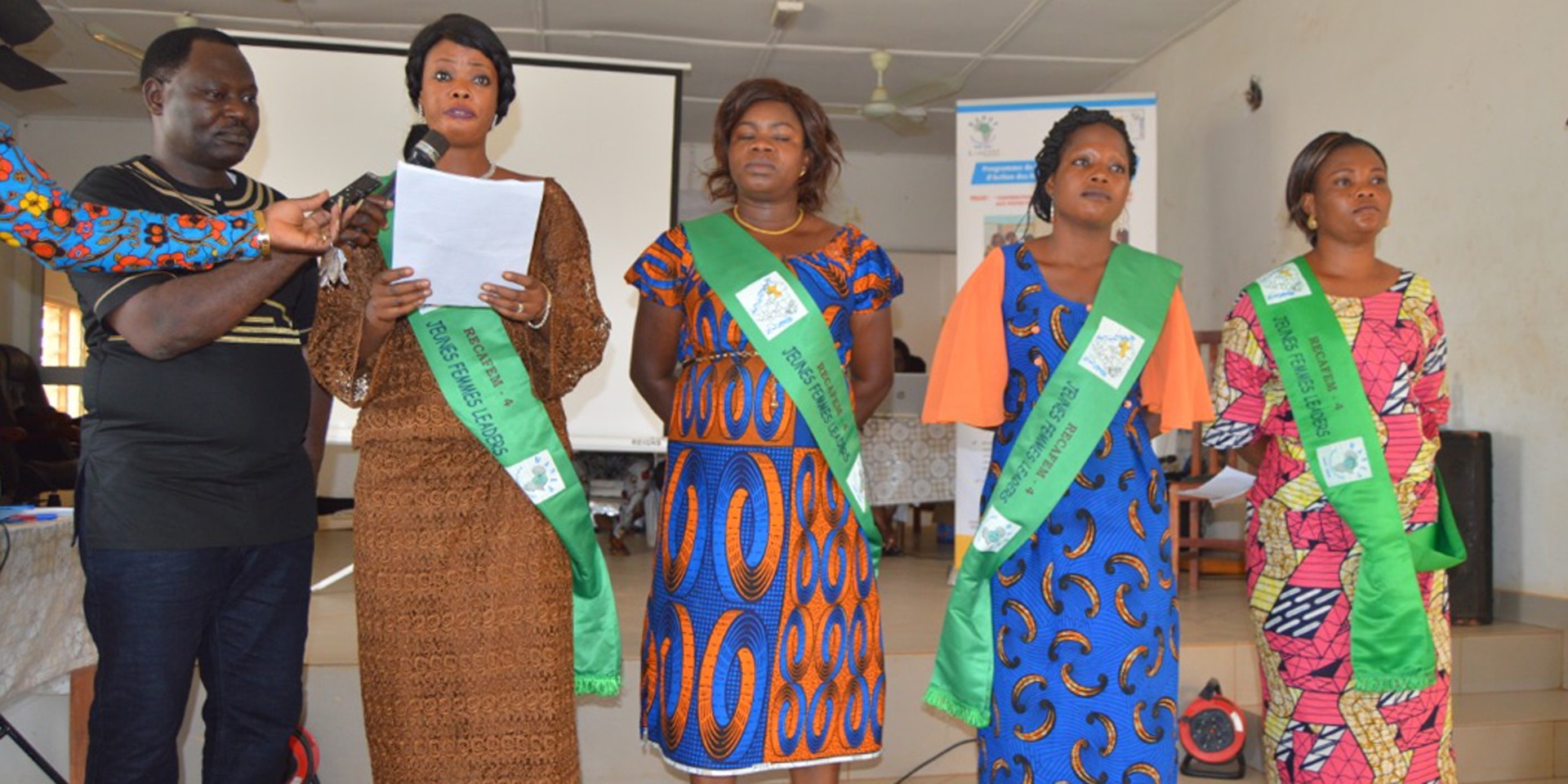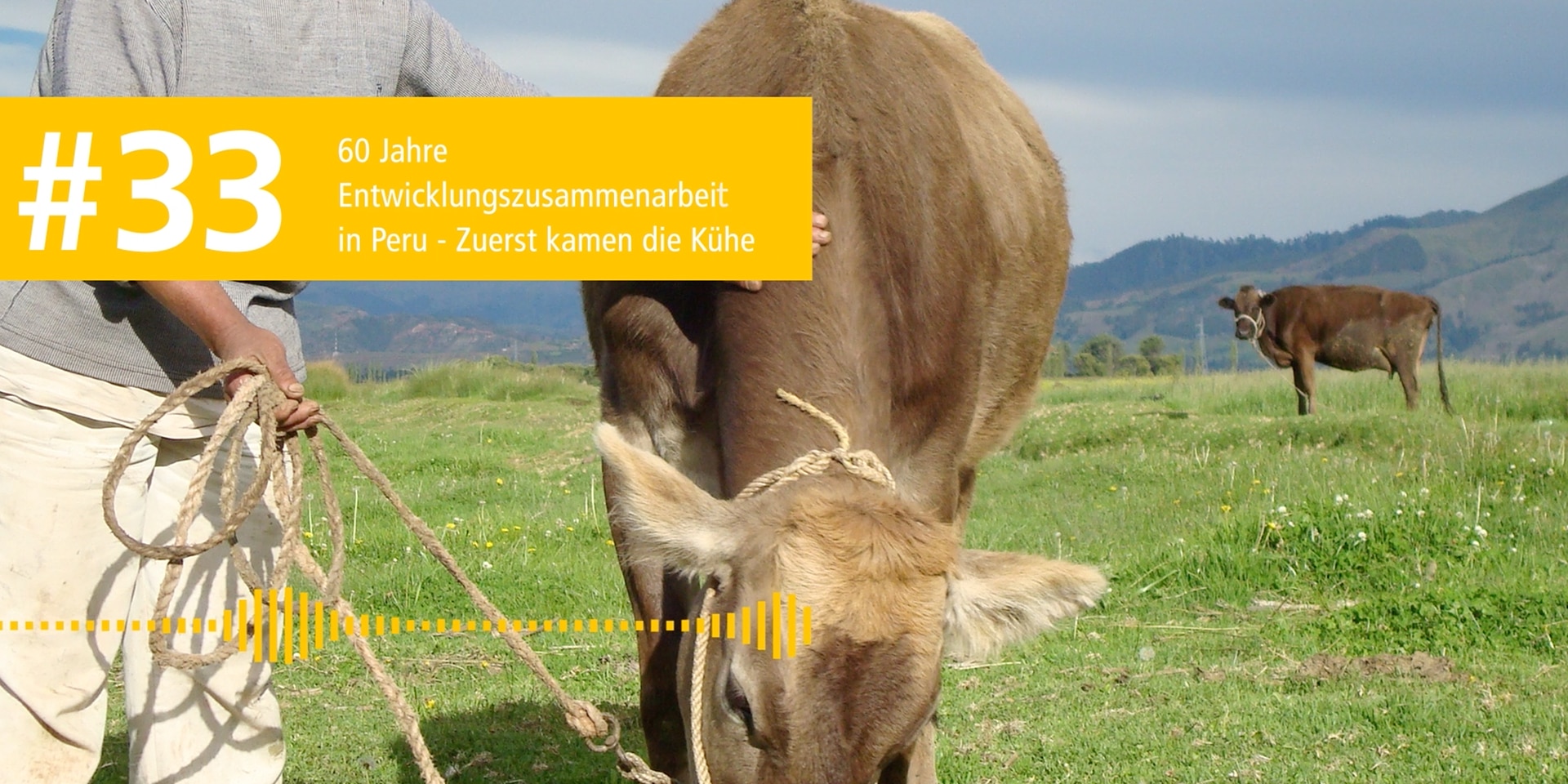The Swiss cooperation, a reliable and flexible actor
Patricia Danzi, the director general of the SDC, recently paid a working visit to Benin and Chad, two priority countries for Swiss international cooperation. She talks to us about Switzerland's contribution to the positive development of Benin, the importance of remaining committed to the Sahel region, and the difficult situation in Chad following the influx of refugees fleeing the crisis in Sudan.
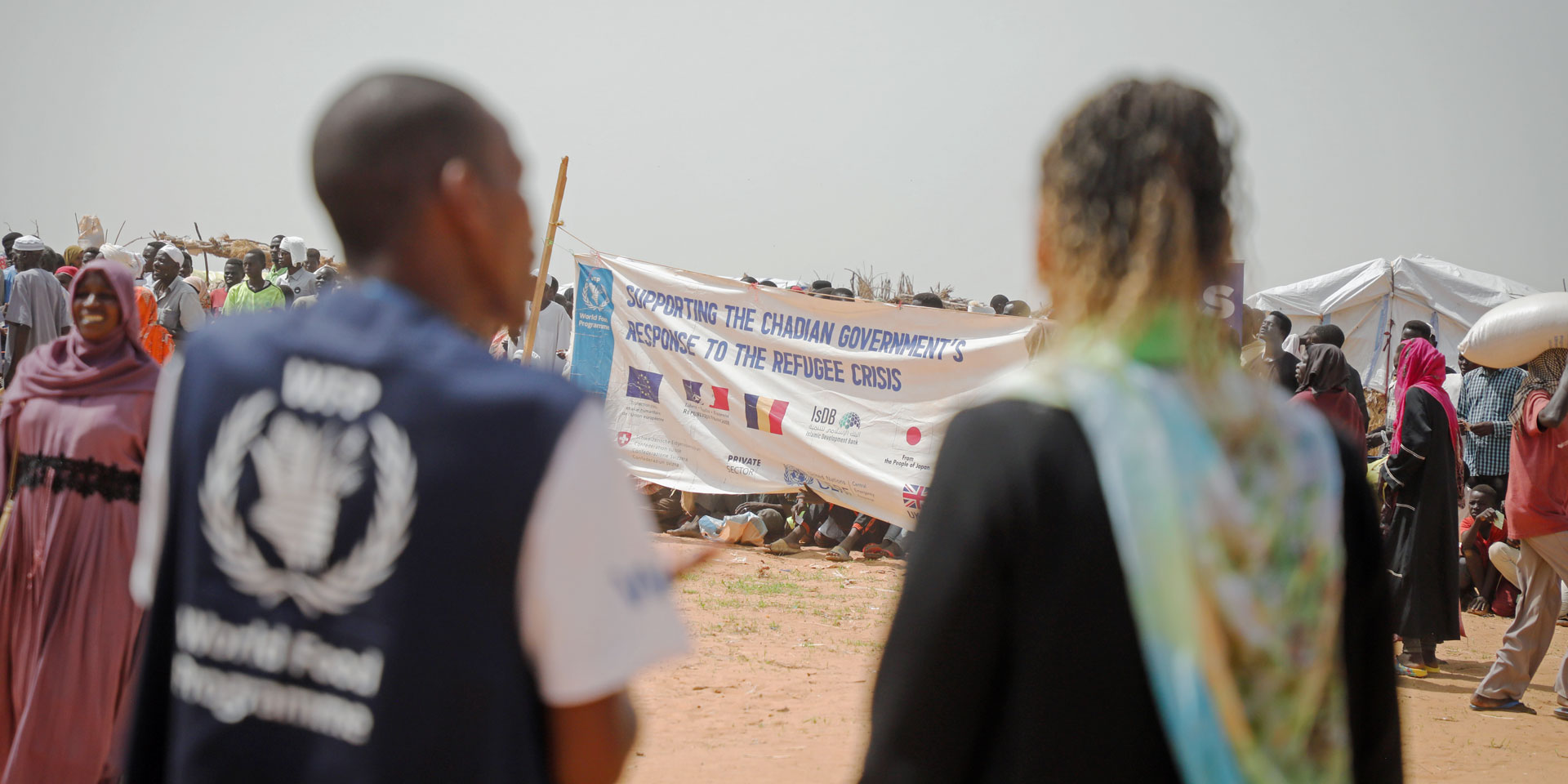
Patrica Danzi outside the Adré refugee camp in Chad, on the border with Sudan. © SDC/WFP
Political and security-related instability, conflicts, vulnerability to climate change, and food insecurity are the major challenges facing the Sahel region and a source of great concern for the people of West Africa. Despite those issues, the region is also experiencing positive developments which need to be sustained over the long term in order to reduce poverty and contribute to lasting peace.
The director general of the SDC, Patricia Danzi, who recently paid a working visit to Benin and Chad, talks to us about Switzerland's contribution to the positive development of Benin and the humanitarian situation in Chad following the crisis in Sudan, as well as the impact on the programme in the longer term. She also explains the importance of remaining involved in the Sahel region and how we can adapt our programmes to the changing needs in such contexts.
Benin and Chad are priority countries for Swiss international cooperation. They are among the poorest countries in the world. According to the UNDP's Human Development Index 2021, Benin ranks 166th and Chad 190th out of 191 countries.
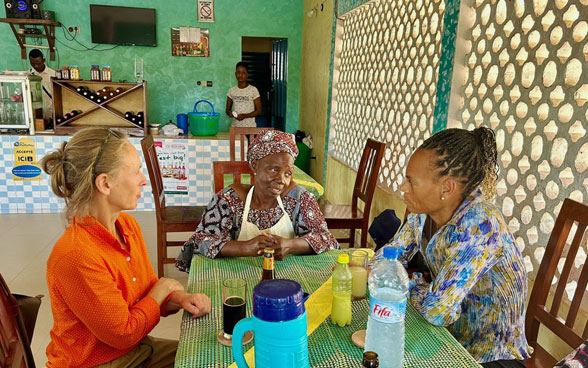
Interview
Ms Danzi, you recently visited Benin and Chad. What was the purpose of your visit?
The first leg of my trip was to Benin, where I wanted to assess to what extent the growing instability in the Sahel region is affecting the country and how Swiss cooperation is adapting to the challenge. In Chad, I especially wanted to get a concrete idea of the situation and needs on the ground in the context of the crisis in Sudan and how this is impacting on development efforts in the country.
Benin is on a positive development trajectory. What do you see as the main reasons for that?
First of all, Benin is a democratic country where elections are held regularly. It has decentralised governance structures that are conducive to development. With a strong vision for development and the delivery of basic needs, particularly in health and education, these structures are key partners. Secondly, Benin is a coastal country which has strong trade links within the greater region. In particular, it benefits from the economy of its neighbour Nigeria, a major economic driving force. Benin is also a key player in trade flows from the coast to the Sahel countries, although these were temporarily interrupted following the coup d'état in Niger.
How is Swiss cooperation contributing to this positive development?
Swiss cooperation is recognised as a reliable actor, close to the people, with a long-term commitment, that knows how to adapt when necessary. It is active beyond the capital in remote and fragile areas, which earns it significant recognition from the central and local authorities as well as from the local population. By supporting local governance structures, it is helping to strengthen the decentralisation of basic services and improve access to them. These are undeniable advantages. In fact, the local officials I met were surprised that I went to the north of the country as soon as I arrived, which I did in order to get a first-hand impression of the living conditions of local people and the work of our partners. Through our decentralised support model, we regularly manage to mobilise other development actors to adopt the same grassroots approach. And our regional programmes in areas bordering Burkina Faso and Niger enable us to reach more remote populations and build bridges.
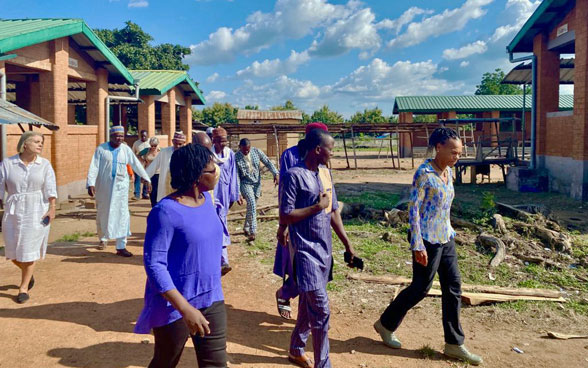
Benin faces security challenges in areas bordering Burkina Faso and Niger. How does that impact on projects in Benin?
Growing insecurity in the region is affecting not just our projects, but the whole country. The recent closure of the border with Niger has had a major impact on the local economy. For example, restaurant owners we supported in developing their businesses lost customers when the lorries stopped passing through. With the ban on cross-border transhumance, livestock sales have plummeted and markets have lost more than half their capacity, depriving state coffers of the tax revenue from these sales. There are also a growing number of refugees from neighbouring countries, which places significant pressure on the local population.
With coups d'état in Mali, Burkina Faso and recently in Niger, the security situation continues to deteriorate. Why is it important for Switzerland to remain involved in the Sahel region and how does it ensure that its projects are effective?
It is important first of all to stress that the objective is the impact that we as Switzerland can have in the Sahel. To achieve this, we always take fragility into account in our analysis and adapt our action to changing needs by combining various instruments of Swiss foreign policy, such as development cooperation, humanitarian aid and peace promotion. We also give priority to working with local authorities and administrations, which generally enables us to continue our programmes over the long term.
In such contexts, shouldn't Switzerland limit its intervention to humanitarian aid?
It depends on the particular crisis you're talking about. A non-violent regime change doesn't necessarily create more humanitarian needs, but it can generate needs in terms of protection of civic space, freedom of the press, etc. However, whatever the crisis, it is important not to neglect either aspect. Humanitarian aid can't be the solution to a political crisis. There is still a need to strengthen basic service delivery systems and good governance.
In the case of Chad, for example, humanitarian needs have increased exponentially as a result of the crisis in Sudan. Nearly half a million more refugees have arrived in the space of four months in an area where structures are inadequate and of poor quality. What is required is strong structures capable of absorbing security or climatic shocks. The one does not exclude the other. It is very rarely the case that we can draw a line under development achievements and concentrate solely on humanitarian aid. It’s counter-productive. What we have to do is avoid focusing solely on the emergency and putting the country's development priorities on the back burner.
Chad is one of the poorest countries in the world, but it has nonetheless taken in more than 400,000 Sudanese refugees since the start of the crisis in Sudan. It's predicted that this number will reach 600,000 by the end of the year. Could you describe the situation on the ground for us?
In N'Djamena, the capital, the changes are hardly noticeable. However, the situation is different in the eastern parts of the country I visited. Sudanese refugees have been arriving en masse, especially from the Darfur region. Almost half a million in the space of four months in the small town of Adré, which has a population of 40,000. The international organisations on the ground don't have the resources required to meet the needs of these people.
What support is Switzerland providing and what does this mean for the programme in the medium term?
First of all, additional resources have been released from our emergency fund. It’s very important, especially for the host populations, that we are able to continue to strengthen sectors such as health, education and food safety. This applies not just to eastern parts of the country, but to the whole nation. Chad is an extremely fragile country, facing multiple shocks. The situation in neighbouring countries – Libya, Sudan, Central African Republic, Niger, Nigeria and the Lake Chad basin – is complicated. I visited a radio station that broadcasts in several local languages and deals with the Lake Chad issue by giving local people a voice to express their concerns. This issue has not been resolved at all. It should be stressed that both sides of Chad are faced with violence and a large number of displaced persons.
With a high level of poverty, a very diverse population and only relative political stability, the situation in Chad is exceedingly complex. The country, which is in a phase of political transition, has asked Switzerland to support it in this process.
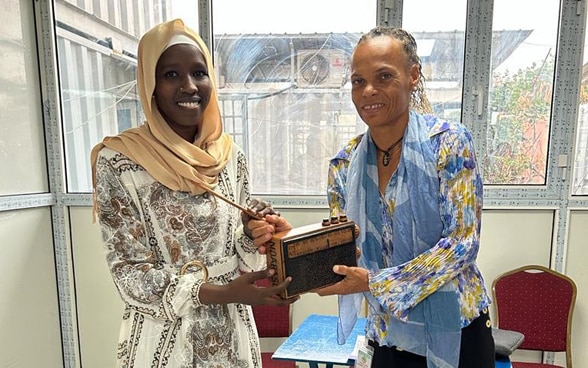
Impressions and testimonials
Literacy programme in Benin
In Benin, we visited a literacy centre for adults in vocational training who never completed their basic education. As children, their parents couldn't afford to send them to school. They had to work, do housework or herd cattle. This literacy programme, supported by Switzerland, enables them to acquire the basic skills – reading, writing and mathematics – that are essential if they are to succeed in their vocational training. Aware of the value of a basic education, these women and men also reminded us how important it was for their children to be able to go to school.
Refugee camp in eastern Chad
The refugees who have fled armed violence in Sudan have lost everything. They have been sleeping for several months in makeshift shelters until they can be transferred to the camp. Often women are alone with their children because they have lost their husbands or have no idea of their whereabouts.
Some of the women from the host populations spoke to me about what it meant for them to be able to access irrigated land thanks to a system of dykes which is supported by Swiss cooperation. Not only have they become more productive, but they are also more respected within their communities and by their husbands.
Radio Ndarason in Chad
"Radio Ndarason speaks to people in their own languages, which is a great strength," said Patricia Danzi during her visit. Radio Ndarason Internationale (RNI), which is supported by Switzerland, provides a forum for dialogue and enables the people of the region to voice their concerns. The outbreaks of violence in the Lake Chad basin are undermining a region that already lacks basic services such as education and health, and has few economic prospects. RNI offers tools to better resist calls for violence from armed groups such as Boko Haram and promote peaceful solutions for communities. The RNI journalists are young people originally from the region who are trained by the station. They have easier access to local residents, who, thanks to this proximity, are able to talk to them openly about the challenges they face.
Article on the SDC director general's visit to Radio Ndarason (fr)
Links
- Télé Tchad coverage of SDC director general addressing journalists (fr)
- The SDC's activities in Benin
- One World: portrait of Benin
- Benin: strengthening the local economy (projet BéniBiz) (fr)
- The SDC in Chad
- One World: portrait of Chad
- The SDC in Sudan
- Mali, informer pour promouvoir la paix (podcast) (fr)

